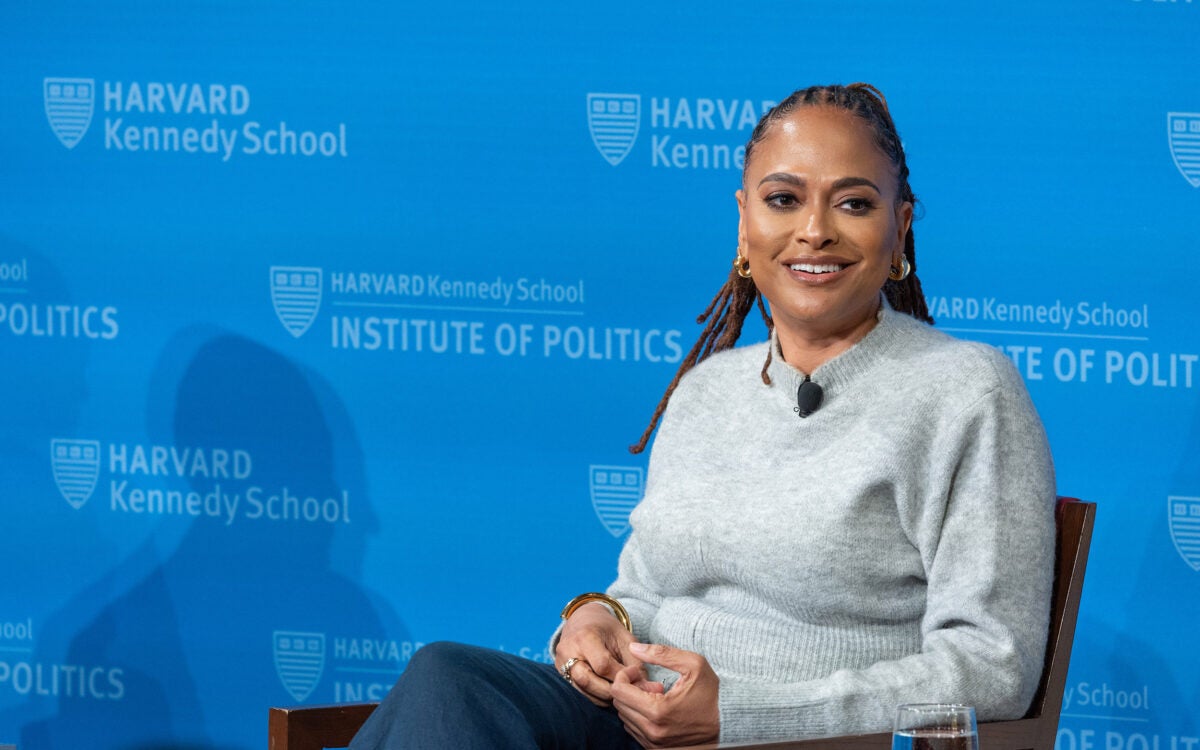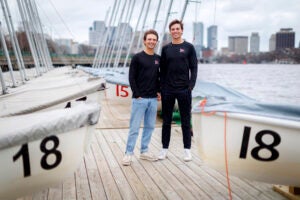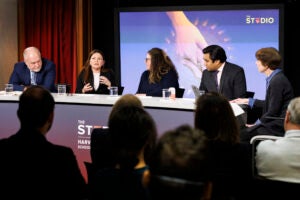Tag: Animals
-
Nation & World
Seeing what they hear, to better understand ourselves
It was a long drive from St. Louis to Florida, but Darlene Ketten had finally made it. Standing in the warm surf of St. George Island, she watched with delight as tiny, colorful bean clams popped out of the sand and then quickly reburied themselves as the waves foamed around her calves.
-
Nation & World
J.J. Audubon the beginner featured in new book
Although the name John James Audubon is synonymous with beautifully detailed, scientifically accurate drawings of birds, many of his early drawings were destroyed by Audubon himself, but an intriguing selection remains in the collections of Harvard’s Houghton Library and the Ernst Mayr Library of the Museum of Comparative Zoology (MCZ).
-
Nation & World
Jamaican lizards’ calisthenics mark territory at dawn, dusk
What does Jack LaLanne have in common with a Jamaican lizard? Like the ageless fitness guru, the lizards greet each new day with vigorous push-ups. That’s according to a new study showing that male Anolis lizards engage in impressive displays of reptilian strength — push-ups, head bobs, and threatening extension of a colorful neck flap…
-
Nation & World
When threatened, a few African frogs can morph toes into claws
Biologists at Harvard University have determined that some African frogs carry concealed weapons: When threatened, these species puncture their own skin with sharp bones in their toes, using the bones as claws capable of wounding predators.
-
Nation & World
Animal interaction behind ‘Cambrian Explosion’?
Harvard Professor of Biology and of Geology Charles Marshall presented his Tuesday (April 29), suggesting that it was an increase in interactions between species, such as predation, that drove an escalating evolutionary process that led to the development of teeth and claws and the wide variety of characteristics that we see among Earth’s animals today.
-
Nation & World
Common aquatic animals show resistance to radiation
Scientists at Harvard University have found that a common class of freshwater invertebrate animals called bdelloid rotifers are extraordinarily resistant to ionizing radiation, surviving and continuing to reproduce after doses of gamma radiation much greater than that tolerated by any other animal species studied to date.
-
Nation & World
Of flies and fish
During her schooldays in 1950s Germany, Christiane Nüsslein-Volhard rarely did her homework. In 1995, she won the Nobel Prize for physiology and medicine. Volhard is now director of the prestigious Max Planck Institute for Developmental Biology in Tübingen, where, decades before, she had been an undistinguished biochemistry undergraduate. She was at Harvard this week (March…
-
Nation & World
Homing in on features of ‘humaniqueness’
Shedding new light on the cognitive rift between humans and animals, a Harvard University scientist has synthesized four key differences in human and animal cognition into a hypothesis on what exactly differentiates human and animal thought.
-
Nation & World
Impact of global warming on health debated
Disagreement over the public health impact of global warming emerged in a symposium Monday morning (Feb. 18) at the annual meeting of the American Association for the Advancement of Science. The colloquium, titled “Sustaining Human Health in a Changing Global Environment,” addressed what hazards can be expected as a result of rapid and continuing climate…
-
Nation & World
Chimpanzees have ‘top guns’ on hunts
While hunting among chimpanzees is a group effort, key males known as “impact hunters” are highly influential within the group. They are more likely to initiate a hunt, and hunts rarely occur in their absence, according to a new study. The findings, which appear in the current issue of Animal Behaviour, shed light on how…
-
Nation & World
Study: Single muscle far more complex than previously believed
New research from Harvard’s Concord Field Station has shown that the common perception of a muscle as a single functional unit is incorrect and that different sections within an individual muscle actually do different work.
-
Nation & World
Fellow’s focus is foggy, froggy forest
In the dark of the Sri Lankan cloud forest, the researchers’ only guide was the headlamps they used to light up the night, illuminating the cold, gray mist that drifted through the trees.
-
Nation & World
Decoding effort reveals fly species’ DNA
An enormous effort to decode the DNA of one of science’s most important laboratory animals — the fruit fly — ended in success this week as a collaboration of researchers from 16 nations announced the sequencing of 10 fly species’ genomes.
-
Nation & World
Taxonomist Carl Linnaeus on show at HMNH
Carl Linnaeus believed that the fruit of the Tree of Knowledge was not an apple but a banana. He came to this conclusion in 1737, while studying plant specimens at Hartecamp, the estate of George Clifford, a wealthy Dutch banker and director of the Dutch East India Company. Clifford collected exotic plants from around the…
-
Nation & World
Taxonomist Carl Linnaeus on show at HMNH
Carl Linnaeus believed that the fruit of the Tree of Knowledge was not an apple but a banana. He came to this conclusion in 1737, while studying plant specimens at Hartecamp, the estate of George Clifford, a wealthy Dutch banker and director of the Dutch East India Company. Clifford collected exotic plants from around the…
-
Nation & World
Over the river, through the woods
For close to 30 Hyde Park preschool children, a recent trip to the Arnold Arboretum, the majestic 265-acre botanical garden run by Harvard University in Jamaica Plain, meant a journey to a world alive with natural wonders and surprises.
-
Nation & World
Field school brings students to Borneo
Morning came in the middle of the night in the hikers’ hut partway up the side of Borneo’s towering Mount Kinabalu.
-
Nation & World
Popular causes not necessarily best
Conservation policies favoring keystone animal species are insufficient to conserve the world’s biodiversity because many of these target animals don’t live in the world’s most biodiverse spots: lowland tropical forests under pressure from agriculture, logging, and other human activities.
-
Nation & World
Biologists remember landmark theory
Forty years ago, Edward O. Wilson and Robert H. MacArthur described how size and isolation determine how many species an island can support. Last week, biologists gathered to mark the theory’s anniversary, calling it a “pivotal point” in ecology’s relatively short history.
-
Nation & World
Harvard brings the Earth to high school
Steam vents in Yellowstone National Park are part of the area’s unique environment, seen in a case study exploring Yellowstone and the reintroduction of wolves into the park. This case study is part of a new environmental science course for high school science teachers.
-
Nation & World
‘Speed limit’ found on rate of evolution
Harvard University scientists have identified a virtual “speed limit” on the rate of molecular evolution in organisms, and the magic number appears to be six mutations per genome per generation — a rate of change beyond which species run the strong risk of extinction as their genomes lose stability.
-
Nation & World
Newsmakers
In August, the Rev. Professor Peter J. Gomes, the Plummer Professor of Christian Morals and Pusey Minister in the Memorial Church, was appointed by Queen Elizabeth II to membership in The Most Venerable Order of the Hospital of St. John of Jerusalem, the oldest order of chivalry in the United Kingdom, dating to the 10th…
-
Nation & World
Losos’ lizards give evolutionary clues in island experiments
Tiny islets in the Bahamas have proven useful laboratories to illustrate natural selection’s effects on island lizards, which saw their legs lengthen, then shorten as ground-dwelling predators drove them into the trees.
-
Nation & World
Primates expect others to act rationally
When trying to understand someone’s intentions, nonhuman primates expect others to act rationally by performing the most appropriate action allowed by the environment, according to a new study by researchers…
-
Nation & World
Jane Goodall: A life in the field
As a girl in England, Jane Goodall had a toy chimpanzee named Jubilee — a harbinger of the primatologist she was to become and of the jubilant audiences that greet her at every turn in adulthood. Beginning in 1960, her groundbreaking studies of chimpanzees in the African wild led to a series of revelations that…
-
Nation & World
Sleep found to repair and reorganize the brain
Most of us do it every night but we don’t know why. If you miss too many nights, it might kill you. We know why we eat, drink, breathe, and move around, but no one can explain why we need to sleep. What does seven or eight hours of snoozing really do for us? Van…
-
Nation & World
Seeing the forest, from the trees
Alain Houle thinks higher-status chimpanzees likely feed on more, higher-quality fruit — found higher up in the tree — than lower-status chimpanzees, which leads to the chimps being in better physical shape and greater breeding success. “I thought I’d be killed,” Houle said later. “They climbed up, looked at me, barked at me, and then…
-
Nation & World
Wilson urges alliance to save species
Edward O. Wilson sees a future in which science and religion join forces to save the natural world. Without such an alliance, said the legendary Harvard biologist and author, an alternative future is in store for the human race: one of accelerating environmental cataclysm fueled by overpopulation, deforestation, declining fisheries, and climate change.
-
Nation & World
Orangutan research yields conservation dividends
The population of the orangutan, one of humankind’s closest animal relatives, has declined with human expansion. The orangutan population declined by 97 percent in the 20th century and over 90 percent of their rainforest habitat has been destroyed. The factors contributing to that decline – illegal logging, conversion of forestland to agriculture, and hunting to…
-
Nation & World
Arctic hit by global warming first
Scientists from the eight nations bordering the Arctic recently enlisted representatives of the region’s native peoples to help assess climate change there. What they found put a human face on a debate often involving distant projections and abstract numbers. Less snow, less sea ice, freezing rain in winter, and the appearance of mosquitoes and robins,…


